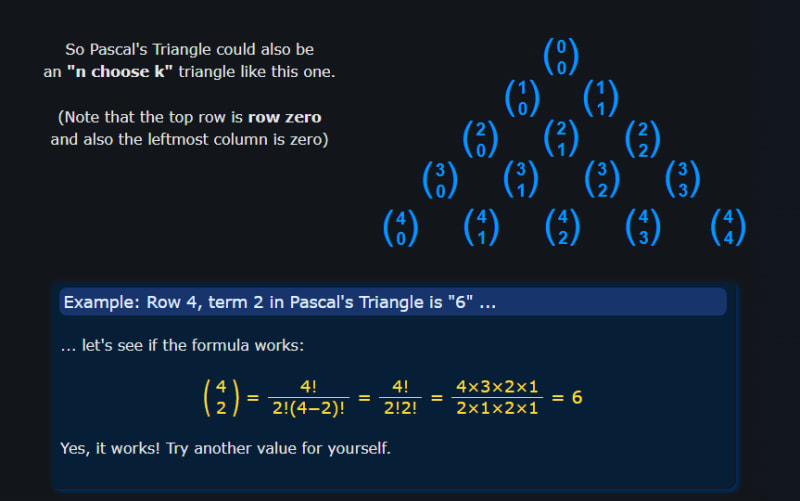Problem:
I was wandering Leetcode (like usual) when I came the 118th problem, Pascal's Triangle, creating a Pascal's Triangle only from a single input, the triangle's height.
The code
function generate(numRows: number): number[][] {
let pascalsTriangle: number[][] = new Array();
for (let i = 0; i < numRows; i++) {
let row: number[] = [];
for (let j = 0; j < i + 1; j++) {
row.push(fac(i) / (fac(j) * fac(i - j)));
}
pascalsTrianglet.push(row);
}
return pascalsTriangle;
}
function fac(n: number): number {
if (n < 0) return -1;
else if (n == 0) return 1;
else {
return n * fac(n - 1);
}
}
Thought Process:
The first thing I wanted to know was how could I create a Pascal's Triangle without code.
Turns out, that's actually pretty easy, thanks to MathIsFun.com (go check them out!) I could find exactally what I needed to learn all about Pascal's Triangles
I was able to find the formula and a pretty cool illustration to show the logic behind the formula:

TL;DR: Divide column's factorial by (row's factorial * (column - row)'s factorial)
Altough this formula only get's us one row, we can dynamically change the variables using code, so that's exactally what we're doing!
Code Breakdown:
The main function
function generate(numRows: number): number[][] {
let pascalsTriangle: number[][] = new Array();
for (let i = 0; i < numRows; i++) {
let row: number[] = [];
for (let j = 0; j < i + 1; j++) {
row.push(fac(i) / (fac(j) * fac(i - j)));
}
pascalsTriangle.push(row);
}
return pascalsTriangle;
}
In the code above we start out by creating a 2d array and initializing a for loop for each row of the triangle
let pascalsTriangle: number[][] = new Array();
for (let i = 0; i < numRows; i++) {
let row: number[] = [];
for (let j = 0; j < i + 1; j++) {
row.push(fac(i) / (fac(j) * fac(i - j)));
}
pascalsTriangle.push(row);
}
In this first loop, we run another loop for calculating the triangle's i'th row
for (let j = 0; j < i + 1; j++) {
row.push(fac(i) / (fac(j) * fac(i - j)));
}
Since we dont have a factorial function in JS, we need to write our own!
function fac(n: number): number {
if (n < 0) return -1;
else if (n == 0) return 1;
else {
return n * fac(n - 1);
}
}
Finally, we append the row to our triangle and return the pascalsTriangle variable after the first loop
pascalsTriangle.push(row);
}
return pascalsTriangle;
}
And that's it!

It's definitely not the best or most efficient solution, but I had a lot of fun researching about the topic and learning something new, and I hope you could enjoy this little article!
Thanks for the support! 👋



Top comments (0)